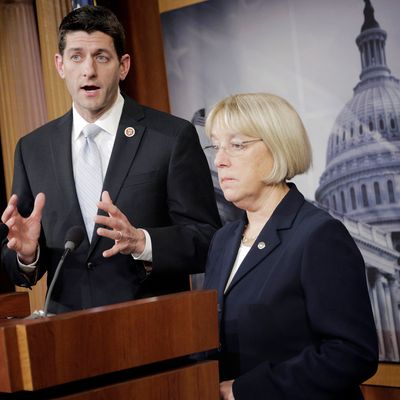
If October’s sixteen-day government shutdown left you yearning for more dramatic brinksmanship from our lawmakers, you’ll be disappointed to learn that House and Senate negotiators have reached a two-year budget agreement. After weeks of negotiations, Representative Paul Ryan and Senator Patty Murray unveiled a modest deal Tuesday night that would partially replace sequestration cuts, avert another shutdown on January 15, and end the budget wars of the past two years (though there’s still the potential for debt ceiling squabbling). As New York’s Jonathan Chait explained last week, while the automatic cuts were intended to be equally objectionable to both parties, Republicans are reluctant to give up something Democrats hate so much. So while the plan has the backing of party leaders on both sides of the aisle, conservatives are blasting the proposal.
The deal calls for a $63 billion increase in spending in 2014 and 2015, which would be paid for with higher fees for airline travelers, and changes in federal employee and military pension programs. It includes permanent changes to other programs that would end up reducing the deficit by $22.5 billion over the next decade.
Conservative groups including Americans for Prosperity and Heritage Action for America registered their opposition on Monday, with the latter complaining that the deal increases spending “in the near-term for promises of woefully inadequate long-term reductions.” Senator Marco Rubio declared his opposition to the plan hammered out by his potential 2016 opponent just after it was announced. “We need a government with less debt and an economy with more good-paying jobs, and this budget fails to accomplish both goals,” he said. “In the short run, this budget also cancels earlier spending reductions, instead of making some tough decisions about how to tackle our long-term fiscal challenges caused by runaway Washington spending.”
Democrats didn’t get an extension on unemployment benefits that expires at the end of the year, but they said they’d push the issue in a separate measure. “This agreement doesn’t include everything I’d like — and I know many Republicans feel the same way. That’s the nature of compromise,” President Obama said. “But it’s a good sign that Democrats and Republicans in Congress were able to come together and break the cycle of shortsighted, crisis-driven decision making to get this done.”
Presuming they can get the measure approved, that is. Congressional aides told Politico there should be enough Democratic support to get it passed, and House leaders are hoping to vote on the compromise before they recess at the end of the week, particularly because it will give opponents less time to pressure lawmakers. “I’m proud of this agreement,” Ryan said. “It reduces the deficit — without raising taxes. And it cuts spending in a smarter way. It’s a firm step in the right direction, and I ask all my colleagues in the House to support it.”






























